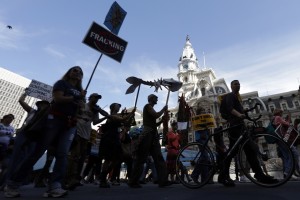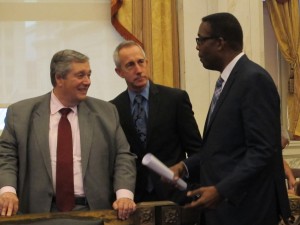Energy industry invests in Philly mayor’s race
-
Susan Phillips

Matt Rourke / AP Photo
Protestors opposed to natural gas drilling rally in front of Philadelphia City Hall during the industry conference in September, 2012.
Since Marcellus Shale development boomed, Philadelphia has been a thorn in the side of the gas industry. The city has not seen many of the economic benefits that places like Williamsport, or Pittsburgh have. And it tends to be home to well-organized, experienced environmental groups used to taking on powerful adversaries.
When the industry invited Mayor Michael Nutter to speak at its annual convention in Philadelphia, Shale Insight, back in the fall of 2012, he chided them, as protestors chanted outside.
“Many of us are deeply concerned about water quality in our watershed,” Nutter told the assembled industry executives. “There is no economic opportunity for which jeopardizing our water quality is acceptable.”
Earlier that year, when the state legislature was about to vote on new oil and gas legislation, including the impact fee, Republican leaders and gas drilling proponents like Joe Scarnati had to strong arm members of the Philadelphia delegation into voting for it. Scarnati threatened to leave the city out in the cold when it came to revenue generated by gas drilling.

Kim Paynter / WHYY
Democratic candidates for mayor meet at the first forum Thursday morning at the Philadelphia Business and Technology Center in Parkside. From left Nelson Diaz, Jim Kenney, Milton Street, Doug Oliver, Anthony Williams, and Lynn Abraham.
But that was 2012. Today, almost all of the Democratic primary candidates for mayor support turning Philadelphia into an “energy hub,” which would use cheap Marcellus Shale gas to boost manufacturing. The idea is being pushed by the Greater Philadelphia Chamber of Commerce.
Suddenly Philadelphia has made it on to the shale gas map. So whoever ends up in City Hall now matters to those drilling upstate. And energy interests are taking an interest in the race, as shown by campaign finance reports released last week.
Still, the amount of money donated by energy interests is chump change compared to what the independent expenditure organizations known as super PACS have raised for the 2015 mayor’s race. WHYY’s Dave Davies reports on how super PACS have brought in $9.1 million, that’s twice as much as all six candidates generated themselves.
State Senator Anthony Hardy Williams voted for Act 13, the state’s drilling law, and his wife, Shari Williams, works for the state’s industry lobbying group, the Marcellus Shale Coalition. Williams has received $1,000 from driller Range Resources, and $500 from Michael Krancer, former head of the Department of Environmental Protection turned industry attorney. (His wife Barbara Krancer, donated $2,900 to former Philadelphia D.A. Lynn Abraham).

Philadelphia Energy Solutions CEO Phil Rinaldi, PGW CEO Craig White and City Council President Darrell Clarke share a moment before hearings on the future of Philadelphia as an energy hub.
Dawood Engineering, a company that builds pipelines, gave Williams $500. Of the six candidates, Williams is the only one required to file a statement of financial interest with the state, and in 2013, he reported receiving $1244.21 from Range Resources, and $907.02 from PECO.
Williams also received $7,100 toward his mayoral run from the PECO PAC, and $1,000 from Exelon. Philip Senechal, CEO of the coal company Stafland Energy, gave Williams $1,000. Phil Rinaldi, CEO of Philadelphia Energy Solutions and a prime advocate of the energy hub, donated $2,000 to the Williams campaign. Despite the donation to Williams, Rinaldi is also an adviser to former city councilman Jim Kenney, to whom he donated $1,000.
Kenney also received $9,000 from PECO PAC, and $10,000 from the Gas Workers Employees Union, which represents PGW employees who successfully fought to prevent the sale of the gas utility last year to a Connecticut company.
Nelson Diaz, who is on the corporate board of Exelon, has taken in $10,000 from the company PAC, as well as $5,000 from Exelon board members. PECO Energy CEO Craig Adams* donated $2,000 to Diaz, who also got $1,000 from the CEO of the Magley Wind Turbine company. Diaz has been the most cautious about the energy hub, raising issues of air quality. Exelon has most of its investments in nuclear and renewable sources of energy.
Doug Oliver, former senior v.p. at Philadelphia Gas Works, only raised about $40,000 total, while Milton Street raised just $4,000. Neither Oliver nor Street received any donations from energy interests.
*Craig Adams is a board member of WHYY.
















